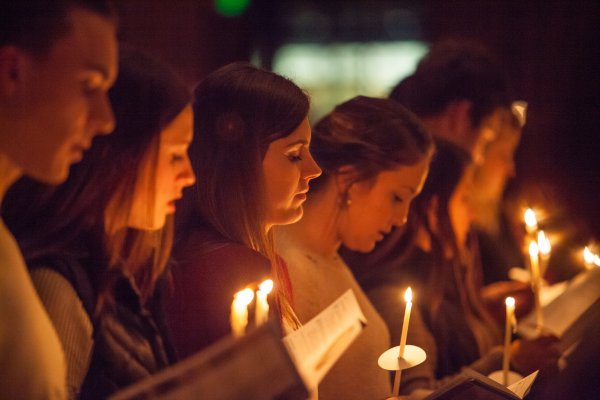Pandemic Perspectives: Pastor Jim
On Sept. 21, 2020, The Torch, Valparaiso University’s campus newspaper, asked members of the Valpo community to write an essay on their personal experience with the COVID-19 pandemic. University Pastor James A. Wetzstein was one of them.
What it’s like to be a collegiate pastor
The campus shut-down in the middle of the spring semester sent us scrambling. Like everyone else on campus striving to rise to the challenge of the moment, the Chapel staff worked to move Valpo’s worship life online and SALT took the steps necessary to continue the World Relief Campaign regardless of the circumstances. I worked with talented and committed students leaders and learned how to preach into my phone from my living room in order to stream Celebrate on Facebook Live and Deaconess Kristin and I hosted over 300 on an Easter Morning WebEx call that, for a time, collapsed under the weight of too many eager microphones. Morning Prayer and Candlelight found their own rhythm online and gathered a community, including appreciative alumni, that would have been impossible otherwise. It was both exciting and exhausting.
I was in the final semester of classes for my Ph.D. program in liturgy at Notre Dame where, like Valpo, all of the classes moved online, saving me four hours of commuting time every week. It wasn’t all bad. My sacramental theology class turned its attention to the phenomenon of digitally mediated worship and I had the opportunity to sort through the question of whether or not one could actually celebrate Holy Communion on the internet –– my current view is that it’s a matter of how one views the technology of mediation including words, speech, amplification, and digital transmission and presence. I was fascinated.
And then came the summer and we were all furloughed. We weren’t allowed to work and it was the worst.
Being a pastor means interacting with people. Under normal circumstances, there is no time when we are completely off the clock. We’re always available, always engaged. Then… we couldn’t be. It felt like the most awful time out, though it was hardly a sacrifice compared to others who have lost jobs and loved ones. Like probably every Lutheran pastor, I read Martin Luther’s letter of 1527, “Whether One May Flee From A Deadly Plague” in which he acknowledged the very real risks of a pandemic even as he affirmed the pastoral vocation to serve those who are suffering.
But now we’re back on campus and it’s so good to see everyone even if only your eyes above the masks. (I am enjoying a heightened appreciation for both the beauty and expressiveness of human eyes.) I’ve adapted to Zoom and find those interactions compelling as well.
The biggest challenge is driven by the necessary limitations on worship life at the Chapel. Because of the old school ventilation system at the Chapel (read: opening windows) we have limited attendance to 100 people at any service at the Chapel and singing by anyone other than four designated singers isn’t allowed. Music is so central to Lutheran spirituality, initially, I couldn’t conceive of a service without everyone singing. But then, we started doing it in the Chapel’s big room with over half the chairs removed and people spread all over. It is, for the time being, serene.
I know that I’ll revel in the day when the Chapel is packed with hundreds if not thousands again and voices are raised in praise, but for now, for this season of anxiety and mourning, the quiet feels right. If you haven’t been by during this time, you should. Even so, I pray it’s never repeated.
In terms of the one on one conversations in which a pastor is privileged to engage, little has changed. I love the conversations (some now online) that turn on the questions of meaning and purpose that come my way and I continue to maintain that one’s college years are exactly the right time to develop a theology that has the capacity to account for both freedom and suffering. I will never tire of the joy of declaring God’s forgiveness over someone who has become burdened by their own sense of failure and shame. It is always an honor to be in the room when divine grace is realized for all that it brings.
We will, at some point, come out of this. My prayer is that we’re neither permanently scarred by the losses we’ve suffered nor forgetful of the blessings that we’ve encountered in this time.
